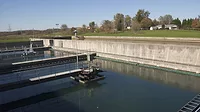Federal Ground Water-related Infrastructure Investment Recommended
From
brownfield cleanups and aquifer storage to geothermal heat pumps and drinking
water systems, federal investment in ground water-related infrastructure could
provide a substantial boost to the public and the economy, the National Ground
Water Association (NGWA) says.
In a position paper developed by the association, NGWA notes that the ground water industry is “poised to help move the nation forward” in ensuring its long-term water and energy needs are met.
“Focused, informed federal government policies and funding that support 21st century infrastructure can assist in achieving a secure water and energy future while providing jobs for groundwater professionals,” NGWA says.
The ground water industry employs more than 200,000 people. They are involved in water well and pump installation and service, environmental consulting, remediation, education, and the manufacturing and distribution of products.
More specifically, NGWA recommends:
In a position paper developed by the association, NGWA notes that the ground water industry is “poised to help move the nation forward” in ensuring its long-term water and energy needs are met.
“Focused, informed federal government policies and funding that support 21st century infrastructure can assist in achieving a secure water and energy future while providing jobs for groundwater professionals,” NGWA says.
The ground water industry employs more than 200,000 people. They are involved in water well and pump installation and service, environmental consulting, remediation, education, and the manufacturing and distribution of products.
More specifically, NGWA recommends:
-
Federal support for water infrastructure that includes managed aquifer recharge
products. Managed aquifer recharge provides a method to replenish ground water
supplies by capturing available water (during wet periods, during periods of
low demand, or water that would be lost otherwise).
- Support
of brownfield projects through grants for assessment, revolving loan funds and
cleanup. An estimated 450,000 brownfield sites pockmark the nation’s landscape.
These sites formerly hosted facilities that produced the nation’s goods,
services and jobs. Currently, however, the expansion, redevelopment or reuse of
that land is hampered by the potential for contamination presence, including
the ground water.
- Government
support for alternative energy development including geothermal energy utilized
through geothermal heat pump systems. Schools and defense facilities around the
country that have installed geothermal heat pump systems are reaping the
benefits through reduced energy use and costs. Dollar savings can be turned to
improving educational outcomes and targeting defense dollars to security
measures.
- Refurbishing and upgrading drinking water systems and infrastructure using skilled and knowledgeable ground water professionals. Ground water professionals determine water supply availability; engineer and install water wells, and pumping and treatment systems; and service these systems.
Looking for a reprint of this article?
From high-res PDFs to custom plaques, order your copy today!






